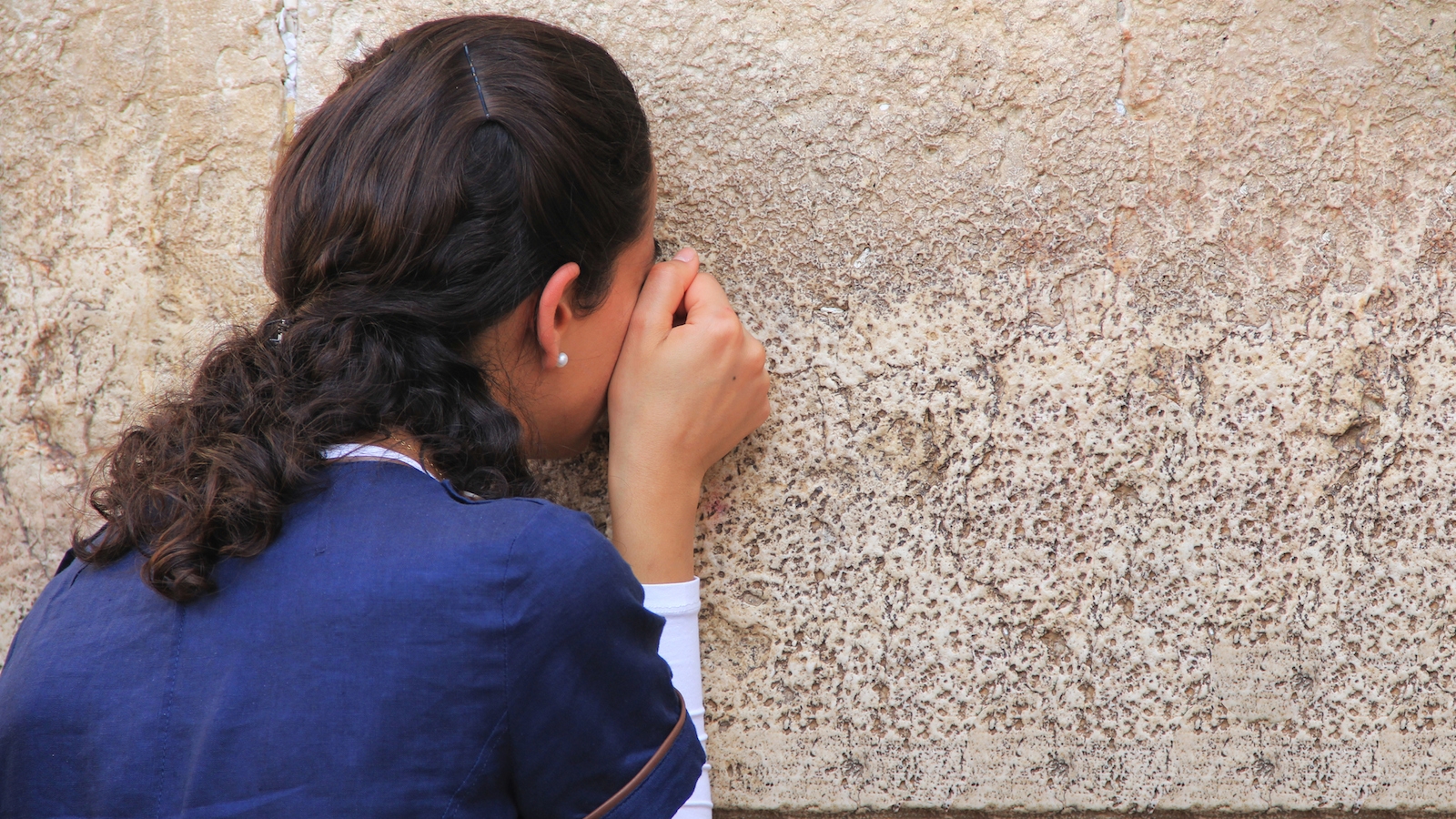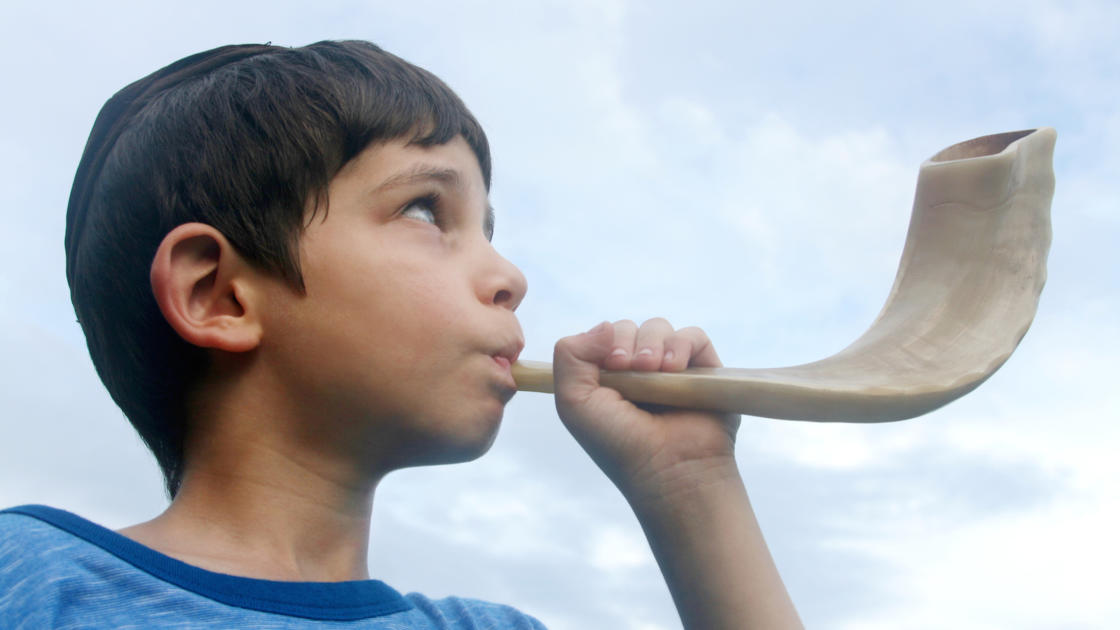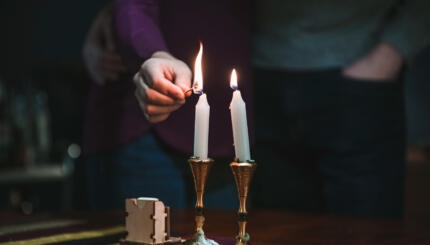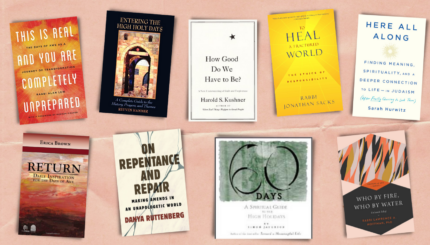Because there is so much at stake spiritually during Rosh Hashanah, we make preparations beginning a full month earlier. At Rosh Chodesh Elul, or the start of the new month of Elul, we begin to stir with anticipation for this day of spiritual renewal. We set out our spiritual provisions by readying our minds for prayer and our hearts for forgiveness and by doing whatever we can to attain God’s compassion and mercy when the Day of Judgment arrives.
Blowing the Shofar Before Rosh Hashanah
The most prominent feature of the month of Elul is the sounding of the shofar each morning, except on Shabbat. Three primary reasons are given for this practice. The first one is to confuse Satan about the date for Rosh Hashanah, so that he will not be able to affect God’s judgment of people with his accusations against them.
The second one pertains to a rabbinic legend, which says that Moses’ ascent to receive the second tablets on the first of Elul was accompanied by blasts of the shofar. Therefore, the shofar reminds us of the story of the Golden Calf and that we must always be aware of our potential for sinning.
The third one has as its source the famous phrase heard at many weddings from the Song of Songs (6:3) Ani l’dodi v’dodi li, meaning “I am my beloved’s and my beloved is mine.” The first letters (aleph, lamed, vav, lamed) of each Hebrew word form an acrostic for the word Elul. From this hint, we gather that the period extending from the beginning of Elul through Yom Kippur (a total of 40 days) is a time ripe to become beloved by God. The shofar alerts us to that loving relationship.
With your help, My Jewish Learning can provide endless opportunities for learning, connection and discovery.
Reciting Selichot, or Penitential Prayers
 Another important practice during Elul is the recitation of Selichot (literally, “forgivenesses”), which are penitential prayers and poems added to the daily morning prayers. This custom is based on a legend portraying King David as troubled over how the Israelites will be able to truly atone for their transgressions. God responds by advising him that the people should confess their sins by saying poems and prayers of penitence.
Another important practice during Elul is the recitation of Selichot (literally, “forgivenesses”), which are penitential prayers and poems added to the daily morning prayers. This custom is based on a legend portraying King David as troubled over how the Israelites will be able to truly atone for their transgressions. God responds by advising him that the people should confess their sins by saying poems and prayers of penitence.
Sephardic Jews (the Jews of Spain, Portugal, the Mediterranean basin, North Africa, the Middle East, and their descendants) recite Selichot for the entire month of Elul until Yom Kippur (except on Shabbat), early every morning. That 40-day span of time parallels the period that Moses spent on Mount Sinai.
However, Ashkenazi Jews (the Jews of Central Europe and their descendants) follow a different tradition. They begin saying Selichot closer to the start of the holiday. Depending on the pattern of the calendar, recitation of Selichot begins either just after the Shabbat that precedes Rosh Hashanah or exactly a week earlier. (Because a minimum four days of saying Selichot is required, if Rosh Hashanah begins on a Tuesday or Wednesday, the saying of Selichot must be moved forward.)
The part of the Ashkenazi tradition that requires a minimum four days of Selichot is based upon the laws about sacrifices during biblical times. The laws required isolating the perfect sacrificial animal from contact with other animals for four days to preserve it from becoming blemished. Consequently, we say Selichot for at least four days to symbolically offer ourselves as a sacrifice. We meticulously engage in prayer and self-examination to rid ourselves of any spiritual defilement that might impede our pure commitment to God on the Day of Judgment.
Either way, the preferred hour for the first recitation in Ashkenazi tradition comes on Saturday night, Motzei Shabbat (the “exit” of the Sabbath), rather than Sunday morning. Evening is the actual start of the Jewish day, and we honor a tradition by beginning at the earliest possible opportunity. In this case, however, Ashkenazim wait until midnight to say the first Selihot because of a desire to extend the beauty of Shabbat until the last minute.
A 19th-century Russian rabbi, Yechiel Michel Ha-Levi Epstein, compiler of the Arukh Ha-Shulhan, offers a beautiful reason for the Ashkenazi Motzei Shabbat tradition, a reason that he bases on the order of Creation. Human beings were created on the sixth day, or erev Shabbat (the day before Shabbat). The first full day of life for human beings was Shabbat, a time when things remain still. It is therefore appropriate that when Shabbat leaves on Saturday night, human beings express one of their primary purposes in life, which is to offer Selichot, passionate pleas of devotion to the Master of the Universe.
Customs for the First Night of Rosh Hashanah

The day before Rosh Hashanah also holds special significance and has its own special customs. In preparation for this sacred holiday the Selichot are more extensive and the shofar is not sounded.
In addition, the cover to the reading table, the parochet (curtain that covers the Torah scrolls), and the dressing of the Torah itself are often changed to white, to represent the motifs of purity and atonement. Other customs include visiting the graves of relatives and loved ones, contributing something significant to charitable causes and sending greeting cards.
Hatarat Nedarim, the Annulling of Personal Vows
On erev Rosh Hashanah, some people choose to perform a ritual of introspection and spiritual mediation called hatarat nedarim, the annulling of vows. The ritual covers only vows made to themselves or to God — not vows made to another person.
In hatarat nedarim an individual asks to be released from vows that may have been said in a heated moment, but were not truly of the heart, and from casual statements that may have been worded as vows, but were not intended as such. This ritual is part of Judaism’s system for giving people second chances; but of course not every vow can or will be annulled.
In this case, a person who wishes to be released from vows finds three other people who also wish to be released from vows. One of those people makes a declaration in the presence of the three others, who serve as a beit din (literally, “house of judgment”) — a legal court according to Jewish law. After the first person is absolved of these vows by the others, another takes a turn asking for absolution while the remaining three serve as the beit din, and so on with the group.
Whether or not one uses the traditional formula found in some prayer books, it is important to practice hatarat nedarim with people who can be open and honest, as well as thoughtful, in their responses.
Reprinted with permission from Celebrating the Jewish Year (Jewish Publication Society).
Want to learn more about the High Holidays? Sign up for a special High Holiday prep email series.
Elul
Pronounced: eh-LULE, Origin: Hebrew, Jewish month usually coinciding with August-September.
erev
Pronounced: EH-ruv, Origin: Hebrew, evening, eve, usually used to denote the first night of a Jewish holiday, such as Erev Yom Kippur (Jewish days begin at sundown).
Rosh Hashanah
Pronounced: roshe hah-SHAH-nah, also roshe ha-shah-NAH, Origin: Hebrew, the Jewish new year.
Shabbat
Pronounced: shuh-BAHT or shah-BAHT, Origin: Hebrew, the Sabbath, from sundown Friday to sundown Saturday.
shofar
Pronounced: sho-FAR or SHO-far, Origin: Hebrew, a ram’s horn that is sounded during the month of Elul, on Rosh Hashanah, and on Yom Kippur. It is mentioned numerous times in the Bible, in reference to its ceremonial use in the Temple and to its function as a signal-horn of war.
Torah
Pronunced: TORE-uh, Origin: Hebrew, the Five Books of Moses.
Yom Kippur
Pronounced: yohm KIPP-er, also yohm kee-PORE, Origin: Hebrew, The Day of Atonement, the holiest day on the Jewish calendar and, with Rosh Hashanah, one of the High Holidays.
Motzei Shabbat
Pronounced: moe-TZAY shah-BAHT, Origin: Hebrew, the evening (Saturday night) immediately following the conclusion of the Jewish Sabbath.
parochet
Pronounced: puh-ROH-khus or puh-RAW-khet, Origin: Hebrew, the curtains covering the ark, or aron kodesh.



